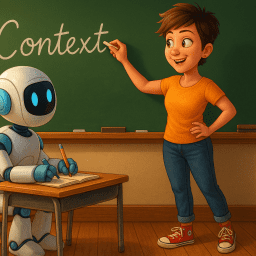
What is AI really costing you when you hand over your creative control?
If you’re a solo or small business owner creating content to grow your business, you already know the pressure to keep up. Between SEO demands, audience expectations, and new AI tools promising shortcuts, it’s tempting to hand over control and “let the robot do it.” But will your audience feel any connection to you when they finally find your content? Or will you sound like everyone else who is letting AI create their content from start to finish?
I’m joined by Emily Gertenbach, a seasoned SEO content strategist who’s been writing human-centered digital content since 2010. She’s worked with clients ranging from local agencies to internationally recognized companies, and she’s here to help us make sense of AI’s role in content creation. Emily brings receipts, nuance, and a bit of tough love as we unpack how AI can help, and hurt, your brand voice, your SEO, and your connection with your audience.
This isn’t a doom-and-gloom episode about robots ruining your content. It’s a human-first conversation about how to use AI responsibly while keeping your creative voice at the center.
How Can Business Owners Best Use AI to Create Branded Content?
“I have worked on some projects with my clients where we’re looking at ways to incorporate AI in the content planning and production process, but I am not using it, you know, to write the bulk of content.” – Emily Gertenbach (12:37)
AI can be a powerful assistant, but you can’t rely on it as a replacement for you. The value lies in using AI to streamline your content planning, not to outsource the voice and tone your audience connects with. Emily recommends using tools like ClearScope or SEMrush to analyze existing content and identify gaps, but the ideas, perspective, and brand story still need to come from you.
Where is AI Most Valuable in the Content Creation Process?
“If you’re giving a piece of content that you’ve spoken or you’ve written and asking it to summarize it into a blurb or timestamp it, that is still going to have that human feel to it because you are the one creating it.” – Emily Gertenbach (26:50)
Emily advocates for using AI as a backend support tool, especially for tasks like transcriptions, show notes, and repurposing. When the original source comes from your voice, like a podcast or video, AI can help streamline without stripping your content of its personality.
How Can We Keep the Humanity and Connection in Our Content When Using AI?
“It needs to be by humans and for humans.” – Emily Gertenbach (22:09)
The key to connection-driven content is remembering who it’s for. Emily shares her six human-first elements for creating high-performing content: accessibility, comfort, readability, connectivity, privacy, and trust. AI can assist in checking for grammar or formatting, but it can’t replicate lived experience, which is central to creating a real connection.
Check out Emily’s blog post on The Heirarchy of Searchers Heirarchy of Needs.
Listen to the full episode here to get all of Emily’s insight, or in your favorite podcast app.
podcast episode chapters
(00:00) Why AI might be costing you more than it saves
(03:15) Meet Emily Gertenbach and her mission to humanize SEO
(04:07) How does generative AI like ChatGPT work?
(05:34) How machine learning is different than generative AI
(07:15) The problem with what generative AI creates
(09:00) A real-world example of AI harming brand connection
(14:48) What happens when Google evaluates AI-written content against quality metrics?
(15:24) What Google actually rewards when ranking your content
(21:18) Emily’s six human-first elements for long-term SEO success
(23:48) Emily’s AI tool recommendations
(28:56) Why you should think twice before feeding AI your blog
(32:30) How small business owners can use AI responsibly
(34:50) Where to connect with Emily and read her blog
Resources & Links Mentioned
https://www.egcreativecontent.com/articles/searcher-hierarchy-of-needs
https://www.egcreativecontent.com/articles/dont-use-ai-for-brand-content
https://www.clearscope.io – SEO content research and optimization tool
https://www.semrush.com – SEO and keyword research tool
https://www.notion.so/product/ai – Document organization and internal content search support
*Image, timestamps, and parts of this blog were generated with ChatGPT.




